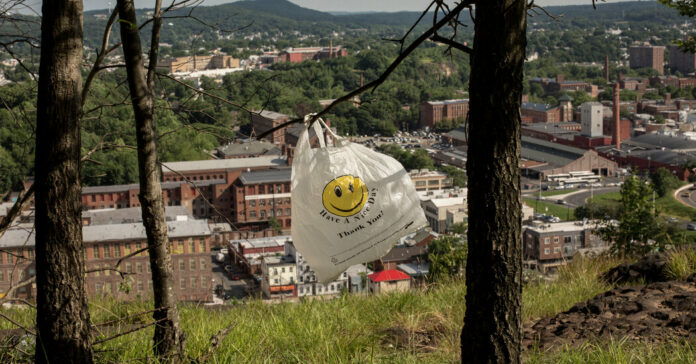The bill, which would make the state the first to ban single-use paper bags at supermarkets, would also ban single-use plastic bags in stores and restaurants.

Paper or plastic? In New Jersey, try neither.
The state Legislature on Thursday voted to make New Jersey the first in the country to ban single-use paper bags in supermarkets along with all single-use plastic bags in stores and restaurants.
Eight other states, including California, New York and Vermont, have bans on single-use plastic bags either in effect now or scheduled to go into effect in the coming years.
But by banning both plastic and paper single-use bags, as well as disposable food containers and cups made out of polystyrene foam, environmental advocates said the New Jersey bill is among the most stringent in the United States.
“This bill is probably the strongest, most comprehensive bill in the nation dealing with plastics and packaging,” said Jeff Tittel, the director of the New Jersey Sierra Club, which had been helping lead the campaign for the ban. “It will go a long way in our battle with plastic pollution.”
Opponents of the bill had argued that it could hurt businesses and that the ban should be limited to plastic bags, since many view paper bags as an environmentally friendly alternative.
But Mr. Tittel said by banning paper bags, New Jersey would be pushing people to use bags made out of recycled or other sustainable materials.
Heidi Brock, the president and chief executive of the American Forest and Paper Association, which represents companies that are part of the paper industry, said that she hoped the governor would block the ban on paper bags.
“The New Jersey Legislature has undermined an environmentally responsible option for consumers,” she said in a statement on Thursday. “Furthermore, the ban on paper bags sends an alarming message in devaluing family wage jobs, which are often union labor, in addition to the indirect jobs supported by the paper and wood products industry in the state.”
The ban would begin 18 months after the bill goes into effect. A spokesman for Gov. Philip D. Murphy said on Thursday that Mr. Murphy intended to sign the bill.
“The governor is proud to support the strongest bag ban in the nation,” the spokesman, Mahen Gunaratna, said. “This bill will significantly reduce the harm that these products cause to our environment.”
Both single-use plastic and paper bags have environmental costs that have drawn the scrutiny of environmental advocates and lawmakers in recent years.
Plastic bags, which can take centuries to decompose, represent about 12 percent of the total plastic waste in America. Paper bags typically require more energy and greenhouse gas emissions to produce.
States and cities have adopted a patchwork of different bag use policies. Some, like New York State, have focused on banning the distribution of plastic bags, which have long been associated with litter and pollution.
States have also adopted less restrictive measures to dissuade people from using paper bags. For example, in California, stores must charge at least 10 cents for recycled paper bags.
Many of the restrictions, in California and elsewhere, have been suspended during the pandemic.
New York’s ban on plastic bags was set to go into effect on March 1. But a lawsuit challenging the ban delayed its enforcement. Last week, state officials said the ban would now go into effect on Oct. 19.
Several states, including Florida, have moved in the other direction, passing laws barring the ability of local governments to ban plastic bags. The plastic industry is also using the pandemic to argue that single-use plastic bags are safer than reusable bags.
In fact, some businesses in New Jersey and elsewhere have stopped allowing customers to use their own bags during the outbreak.
The New Jersey bill says that the ban on plastic and paper bags does not apply to bags used solely to wrap meat or fish, laundry bags or newspaper bags, among other exceptions.
The bill attracted the support of the New Jersey Food Council, an industry group representing food retailers and suppliers, which argued that navigating different policies about what bags could be used in different municipalities across the state was burdensome for retailers.
“The ban on paper bags is critically important; they have just as significant of an environmental impact as plastic bags,” said Linda Doherty, president and chief executive of the council. “Without this ban, consumers would have simply moved to paper single-use bags, failing to address the underlying goal of reducing our reliance on single-use products.”
Other industry groups have opposed the ban.
Dennis Hart, the executive director of the Chemistry Council of New Jersey, said that legislators rushed through the passage of the bill without carefully considering the relative benefits of polystyrene products compared to alternatives. He said the ban would hurt manufacturers and other businesses based in New Jersey.
“New Jersey’s restaurants, God knows how many of them are going to survive the pandemic,” he said. “Even if they do, they’re going to be in financially bad shape for a very long time. All this bill is going to do is add more burden of cost for a less quality product.”







